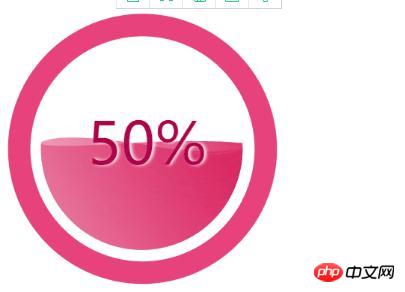Heim >Web-Frontend >js-Tutorial >Javascript-Produktion, SVG-Progress-Ball-Beispielfreigabe
Javascript-Produktion, SVG-Progress-Ball-Beispielfreigabe
- 小云云Original
- 2018-03-15 09:27:062152Durchsuche
Mit der heutigen Entwicklung von SVG wurde es in verschiedenen Anwendungen im Internet verwendet, einschließlich der Erstellung von Fortschrittsbalken und Fortschrittsbällen. Wie erstellt man diese Art von animierter Interaktion? Als nächstes verraten wir Ihnen das Geheimnis!
1. Interessenberatung > Endeffekt - SVG-Fortschrittsball:

2. Struktur
<!DOCTYPE html>
<html>
<head>
<meta charset="utf-8">
<title></title>
<style type="text/css">
.perText{font-size:58pt;font-family:Arial Rounded MT Bold;fill:#AD054A;text-anchor:middle;dominant-baseline: middle;text-shadow: 3px 0 6px #fff;transform:translate3d(6px,0,0);}
</style>
</head>
<body>
<svg xmlns="http://www.w3.org/2000/svg" x="0px" y="0px" width="384.415px" height="383.232px" viewBox="0 0 384.415 383.232" >
<circle style="fill:#E8427D;" cx="192.668" cy="195.399" r="180"/>
<circle style="fill:#FFFFFF;" cx="192.668" cy="195.399" r="150"/>
<circle style="display:none;fill:none;stroke:#000000;stroke-miterlimit:10;" cx="796.667" cy="-58.434" r="140.123"/>
<path style="fill:none;" d="M656.667,8386.899"/>
<path style="fill:none;" d="M656.667-7996.101"/>
<g>
<!-- 定义变量 -->
<defs>
<circle id="SVGID_1_" cx="191.668" cy="195.069" r="135" fill="red"/>
</defs>
<clipPath id="SVGID_2_">
<use xlink:href="#SVGID_1_" style="overflow:visible;" cx="191.668" cy="295.069" />
</clipPath>
<linearGradient id="SVGID_3_" gradientUnits="userSpaceOnUse" x1="431.4199" y1="221.6279" x2="-31.4133" y2="488.8449">
<stop offset="0" style="stop-color:#DA1654"/>
<stop offset="0.6452" style="stop-color:#E1457C;stop-opacity:0.4731"/>
<stop offset="1" style="stop-color:#F7F8F8;stop-opacity:0.3"/>
</linearGradient>
<linearGradient id="SVGID_4_" gradientUnits="userSpaceOnUse" x1="462.0762" y1="286.5215" x2="-63.9186" y2="590.2048">
<stop offset="0" style="stop-color:#F7F8F8;stop-opacity:0.3"/>
<stop offset="0.5" style="stop-color:#E1457C;stop-opacity:0.4731"/>
<stop offset="0.871" style="stop-color:#DA1654"/>
</linearGradient>
<!-- clip-path:url(#SVGID_2_) -->
<g class="group" id='pathGroup' style="clip-path:url(#SVGID_2_)">
<!--<path class="bgPath bgPath_01" style="fill:url(#SVGID_3_);" id="bgPathOne">
<animate
dur="5s"
attributeName="d"
attributeType="XML"
repeatCount="indefinite"
values=""
calcMode="linear"
keyTimes="0;.6;1"></animate>
</path> -->
<path class="bgPath bgPath_02" style="fill:url(#SVGID_3_);" d="">
<animate
dur="5s"
attributeName="d"
attributeType="XML"
repeatCount="indefinite"
values=""
calcMode="linear"
keyTimes="0;.3;1"></animate>
</path>-->
</g>
<text x='192.668' y='195.399' class="perText">50%</text>
</g>
</svg>
</body>
</html>3. JavaScript berechnet den Pfad und steuert die SVG-Animation
class svgPercent
{
constructor({y1,y2,group,text})
{
this.y1 = y1 ? y1 : 0;
this.y2 = y2 ? y2 : 0;
this.group = group;
this.xmlns = 'http://www.w3.org/2000/svg';
this.textBox = text;
this.currentPercentText = '0%';
//初始 进度球
this.init();
}
init()
{
//1.获取路径数据
this.getSvgPathData(this.y1,this.y2);
//2.根据数据绘制路径
this.createPath();
//3.设置百分比
this.setPercentText();
//4.模拟进度增长的情况
this.changePathShape();
}
initChangeShape()
{
//1.获取路径数据
this.getSvgPathData(this.y1,this.y2);
//2. 设置路径形状改变
this.setPaths();
}
//获取路径数据
getSvgPathData(y,y2)
{
this.d1=`M327.898,${225.235+y}c3.086,${-11.496+y},4.74,${-11.496+y},4.74,${-36.167+y}c0,${0+y},-31.712,${-28.628+y},-140.67,${-2+y}c-120.71,${29.5+y},-125.21,${11+y}-140.67,${0.35+y}c0.032,${13.105+y},1.862,${25.787+y},5.247,${37.817+y}h-90.043 v390 h467 v-390 H327.898 z`;
this.a1=`M 327.898,${225.235+y}c 3.086,${-11.496+y},4.74,${-23.611+y},4.74,${-36.167+y}c 0,${0+y},-23.971,${54.165+y},-140.67,${-2+y}c-111.97,${-53.888+y}-135.301,${-9.835+y}-140.67,${0.35+y}c 0.032,${13.105+y},1.862,${25.787+y},5.247,${37.817+y}h-90.043 v390 h 467 v-390 H 327.898 z`;
this.d2 = `M 327.898,${237.031+y2}c 3.086,${-14.234+y2},4.74,${-29.236+y2},4.74,${-44.785+y2}c 0,${0+y2}-30.305,${36.653+y2}-140.67,${-2.477+y2}c-118.866,${-42.144+y2}-134.529,${-9.191+y2}-140.67,${0.434+y2}c 0.032,${16.229+y2},1.862,${31.933+y2},5.247,${46.828+y2}h-90.043 v 405.865 h 467 V ${237.031+y2} H 327.898 z`;
this.a2 = `M 327.898,${237.031+y2}c 3.086,${-14.234+y2},4.74,${-29.236+y2},4.74,${-44.785+y2}c 0,${0+y2}-56.638,${-36.347+y2}-140.67,${-2.477+y2}C 74.997,${236.916+y2},63,${199.232+y2},51.299,${190.203+y2}c 0.032,${16.229+y2},1.862,${31.933+y2},5.247,${46.828+y2}h-90.043 v 405.865 h 467 V ${237.031+y2} H 327.898 z`;
}
//创建path路径
createPath(group)
{
this.pathOne = document.createElementNS(this.xmlns,'path');
this.animate = document.createElementNS(this.xmlns,'animate');
this.pathOne.setAttribute('style','fill:url(#SVGID_3_)');
this.pathOne.setAttribute('d',this.d1);
this.animate.setAttribute('dur','5s');
this.animate.setAttribute('attributeName','d');
this.animate.setAttribute('attributeType','XML');
this.animate.setAttribute('repeatCount','indefinite');
this.animate.setAttribute('keyTimes','0;0.55;1');
this.animate.setAttribute('values',this.d1+';'+this.a1+';'+this.d1);
this.pathOne.appendChild(this.animate);
this.group.appendChild(this.pathOne);
this.pathTwo = document.createElementNS(this.xmlns,'path');
this.animate2 = document.createElementNS(this.xmlns,'animate');
this.pathTwo.setAttribute('style','fill:url(#SVGID_3_)');
this.pathTwo.setAttribute('d',this.d2);
this.animate2.setAttribute('dur','5s');
this.animate2.setAttribute('attributeName','d');
this.animate2.setAttribute('attributeType','XML');
this.animate2.setAttribute('repeatCount','indefinite');
this.animate2.setAttribute('keyTimes','0;0.55;1');
this.animate2.setAttribute('values',this.d2+';'+this.a2+';'+this.d2);
this.pathTwo.appendChild(this.animate2);
this.group.appendChild(this.pathTwo);
}
//设置path路径
setPaths()
{
this.pathOne.setAttribute('d',this.d1);
this.pathTwo.setAttribute('d',this.d2);
this.animate.setAttribute('values',this.d1+';'+this.a1+';'+this.d1);
this.animate2.setAttribute('values',this.d2+';'+this.a2+';'+this.d2);
}
//设置百分比文字
setPercentText(val)
{
let vals = val ? val : this.currentPercentText;
this.textBox.textContent = vals;
}
//改变路径形状
changePathShape()
{
let dis = 0.3;
let percent = '';
let p = '';
let start = this.y1;
let end = -50;
let This = this;
function step()
{
This.y1 -= dis;
This.y2 -= dis;
This.initChangeShape();
percent = parseInt((Math.abs(This.y1 - start) / Math.abs(end-start))*100);
p = percent + '%';
This.setPercentText(p);
if(percent < 50){
requestAnimationFrame(step);
}
}
requestAnimationFrame(step);
}
}
// 初始化配置参数调用
let obj = {
y1: 50,
y2: 50,
group: document.querySelector('#pathGroup'),
text: document.querySelector('.perText')
}
new svgPercent(obj);4. Zusammenfassung:
(1) Steuern Sie den Pfad durch das animierte d-Attribut (Beachten Sie, dass es Fallstricke gibt. Werte haben mindestens drei Wertesätze.values="ursprünglicher Wert; zu ändernder Wert; ursprünglicher Wert")
(2) Das d-Attribut Der Pfad wird über die JS-Steuerung verwendet (Beachten Sie, dass es einen Fallstrick gibt. Beim Zusammenfügen von Zeichenfolgen darf am Ende kein Semikolon stehen und es wird ein Fehler gemeldet; beim Zusammenfügen von Werten müssen Sie ein separates Semikolon hinzufügen)
(3) Die Verwendung von ClipPath-Tags ist in diesem Fall ein Kern, um rollende Wellen von unten nach oben zu implementieren.
Das obige ist der detaillierte Inhalt vonJavascript-Produktion, SVG-Progress-Ball-Beispielfreigabe. Für weitere Informationen folgen Sie bitte anderen verwandten Artikeln auf der PHP chinesischen Website!
In Verbindung stehende Artikel
Mehr sehen- Eine eingehende Analyse der Bootstrap-Listengruppenkomponente
- Detaillierte Erläuterung des JavaScript-Funktions-Curryings
- Vollständiges Beispiel für die Generierung von JS-Passwörtern und die Erkennung der Stärke (mit Download des Demo-Quellcodes)
- Angularjs integriert WeChat UI (weui)
- Wie man mit JavaScript schnell zwischen traditionellem Chinesisch und vereinfachtem Chinesisch wechselt und wie Websites den Wechsel zwischen vereinfachtem und traditionellem Chinesisch unterstützen – Javascript-Kenntnisse

